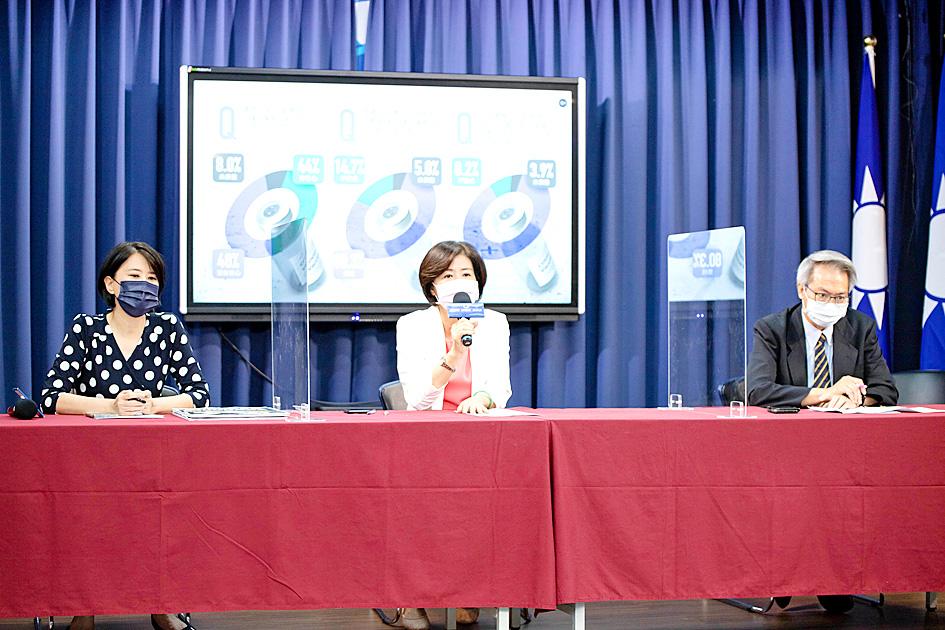About three-quarters of Taiwanese believe that a local outbreak of COVID-19 was due to eased quarantine requirements for aircrew members and a shortage of COVID-19 vaccinations, a survey released by the Chinese Nationalist Party (KMT) showed yesterday.
Conducted from Tuesday to Thursday last week, the survey asked members of the public whether they agreed that the outbreak was caused by shortening quarantines for airline personnel to three days, as well as a too-low vaccination rate.
The results showed that 75.7 percent of respondents agreed, while 18.8 percent disagreed and 5.5 percent gave no response.

Photo courtesty of the Chinese Nationalist Party (KMT)
Forty-four percent of respondents were confident that domestically developed COVID-19 vaccines would offer sufficient protection, while 48 percent said they were not confident and 8 percent gave no response, it showed.
The survey showed that 80.3 percent of respondents agreed that Taiwanese-made vaccines should complete phase 3 clinical trials before being administered to the general public, while 14.7 percent disagreed and 5 percent gave no response.
It showed that 87.9 percent of respondents agreed that the government should import enough internationally certified vaccines, and allow people to choose between domestically developed and imported jabs, while 8.2 percent disagreed and 3.9 percent gave no response.
The survey also showed that 64.7 percent of people worried the vaccine shortage would prevent themselves or their families from being inoculated “in a short period of time,” while 33.8 percent were not worried and 1.5 percent gave no response.
KMT Culture and Communications Committee director-general Alicia Wang (王育敏) told an online news conference that even considering vaccine donations from the US and Japan, Taiwan’s vaccination rate would only reach 15.5 percent.
Private groups, including Hon Hai Precision Industry Co, Taiwan Semiconductor Manufacturing Co and the Tzu Chi Foundation have made attempts to procure vaccinations for Taiwan, Wang said, adding that the government should support their efforts.
A lack of transparency concerning the efficacy of Taiwanese-made vaccines is the main reason people are divided on the issue, the KMT said in a statement.
Various polls have shown that Taiwanese are not opposed to domestic vaccines, it said.
However, people want phase 3 trials to be conducted and the chance to choose which brand of vaccine they receive, the KMT said.
The survey, carried out by Apollo Marketing Research Co via telephone interviews, collected 1,034 valid responses. It had a margin of error of 3.05 percentage points.

Taiwanese scientists have engineered plants that can capture about 50 percent more carbon dioxide and produce more than twice as many seeds as unmodified plants, a breakthrough they hope could one day help mitigate global warming and grow more food staples such as rice. If applied to major food crops, the new system could cut carbon emissions and raise yields “without additional equipment or labor costs,” Academia Sinica researcher and lead author the study Lu Kuan-jen (呂冠箴) said. Academia Sinica president James Liao (廖俊智) said that as humans emit 9.6 billion tonnes of carbon dioxide compared with the 220 billion tonnes absorbed

The Taipei Mass Rapid Transit (MRT) Wanda-Zhonghe Line is 81.7 percent complete, with public opening targeted for the end of 2027, New Taipei City Mayor Hou You-yi (侯友宜) said today. Surrounding roads are to be open to the public by the end of next year, Hou said during an inspection of construction progress. The 9.5km line, featuring nine underground stations and one depot, is expected to connect Chiang Kai-shek Memorial Hall Station to Chukuang Station in New Taipei City’s Jhonghe District (中和). All 18 tunnels for the line are complete, while the main structures of the stations and depot are mostly finished, he

Taipei is to implement widespread road closures around Taipei 101 on Friday to make way for large crowds during the Double Ten National Day celebration, the Taipei Department of Transportation said. A four-minute fireworks display is to be launched from the skyscraper, along with a performance by 500 drones flying in formation above the nearby Nanshan A21 site, starting at 10pm. Vehicle restrictions would occur in phases, they said. From 5pm to 9pm, inner lanes of Songshou Road between Taipei City Hall and Taipei 101 are to be closed, with only the outer lanes remaining open. Between 9pm and 9:40pm, the section is

China’s plan to deploy a new hypersonic ballistic missile at a Chinese People’s Liberation Army Rocket Force (PLARF) base near Taiwan likely targets US airbases and ships in the western Pacific, but it would also present new threats to Taiwan, defense experts said. The New York Times — citing a US Department of Defense report from last year on China’s military power — on Monday reported in an article titled “The missiles threatening Taiwan” that China has stockpiled 3,500 missiles, 1.5 times more than four years earlier. Although it is unclear how many of those missiles were targeting Taiwan, the newspaper reported